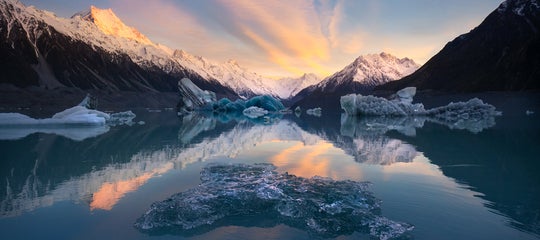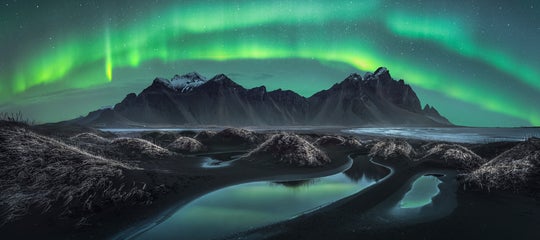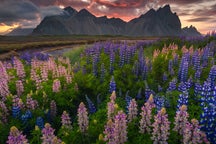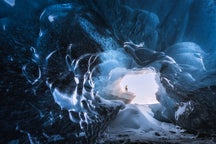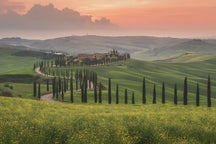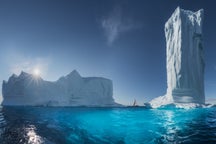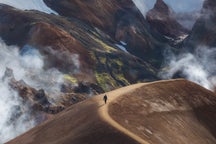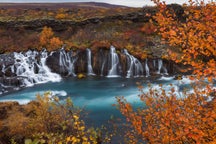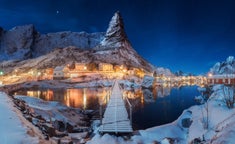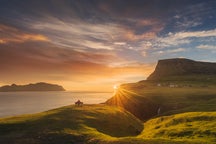This month, we had the pleasure of sitting down with one of our amazing photography guides at Iceland Photo Tours, none other than Raymond Hoffman!
Based in Iceland, Raymond is an expert in photographing the magnificent nature of the Nordic nations.
This award-winning photographer has had his work featured in various publications, from books to newspapers and magazines, and actively takes on assignments for publishers and advertising agencies.
We caught up with Raymond to talk about how it came to be that he is living in Iceland today, what kind of skills are required of a photography guide in Iceland, and the importance of good communication during a photo workshop.
- Check out these Germany Photo Tours and Workshops
- Explore these articles on Landscape and Nature Photography
- Discover this Landmannalaugar Photography Day Tour
Hello Raymond! Tell us a bit about your background and how it came to be that you are living in Iceland today.
Hello! My story is a very special one. I first came to Iceland as a tourist several times before I ended up moving here. It was a long time ago when I was on a hiking tour and I fell in love with an Icelandic woman. Some months later, I quit my job in Germany and moved to Iceland to be with her.
That was already 14 years ago now, though it still seems like we met only yesterday. I am very happy here in Iceland with my Icelandic wife and our three children.
 Godafoss. Photo by: 'Raymond Hoffman'.
Godafoss. Photo by: 'Raymond Hoffman'.
At what age did you become interested in photography?
I think I was 12 years old when my grandpa gave me a camera. From then on, my interest in photography was awakened. I started taking my camera everywhere I went and taking photos of everything. Photography became a medium through which I could freeze the magical moments around me in this world.

Why did you decide to specialise in landscape photography?
I decided to specialise in landscape photography because I like being out in nature. I like big scenery with dramatic light… there is something wild and captivating about it.
When I am out in nature taking photographs, it feels like I have captured something truly extraordinary in an otherwise normal existence. With landscape photography, you can catch the world the way that it is in a specific moment in time, before it changes and evolves.
 Northern Lights in Iceland. Photo by: 'Raymond Hoffman'.
Northern Lights in Iceland. Photo by: 'Raymond Hoffman'.
What inspires you most about photography in the Arctic?
The things that inspire me most about photography in the Arctic are the light, the landscape and how different the environment can be, depending on the seasons. One moment it can be harsh, though the next it can be soft and serene.
There is something so intriguing about learning to work within these conditions. It can be as difficult or as easy as you make it. The remoteness of the Arctic and the isolation of it are also key factors for my inspiration.
 Autumn at Vestrahorn. Photo by: 'Raymond Hoffman'.
Autumn at Vestrahorn. Photo by: 'Raymond Hoffman'.
You’ve been a photography guide for many years. What is the best part of working with Iceland Photo Tours?
I have worked as a guide for many different companies, though I’ve found that there is a great concept behind Iceland Photo Tours that keeps me focused on staying with the company. It is the perfect team and everyone is always doing their best to find solutions in often difficult and challenging circumstances.
I also love meeting people from near and far and teaching them everything I know about photography, as well as demonstrating it in-field!
 Northern Lights at Kirkjufell. Photo by: 'Raymond Hoffman'.
Northern Lights at Kirkjufell. Photo by: 'Raymond Hoffman'.
What kind of skills do you need to be a photography guide in Iceland?
Being a photography guide in Iceland is a demanding and oftentimes difficult job. You need a good knowledge of the geography of the country in order to maximise your access to great photography locations. It is all about using that knowledge and intertwining it with the weather predictions, as well as your local knowledge of the weather circumstances, in order to guarantee that your group receives the best light possible for their pictures.
So to say, it is: “to be in the right place at the right time”.
 Diamond Ice Beach. Photo by: 'Raymond Hoffman'.
Diamond Ice Beach. Photo by: 'Raymond Hoffman'.
Have you ever had anything go wrong on a tour and if so, and how did you handle it?
I haven’t really had anything go wrong on a tour, but I place a lot of emphasis on understanding the dangers and threats before entering a scene and making the participants of a tour aware of these also. I believe that the best method is prevention of risks, not cure. It’s important for people to know that the conditions can make a scene unsafe, and to be alert at all times.
For example, when shooting at the ice beach near Jökulsárlón glacier lagoon. It’s not just about capturing the perfect moment in your photograph – if you don’t keep an eye on the waves, then you might very well end up drenched!

You are known for taking participants to some of the most stunning locations on this planet, at just the right time for the perfect shot. What do you look for in a landscape or the conditions when you are planning a shoot?
When planning a shoot, it is all about the light and finding the perfect composition of the scenery for the picture. To ensure the best conditions, I use my knowledge of local meteorological maps and wind directions to help decide where and when to go.
Sometimes, it might be raining and cloudy but if you monitor the maps, then you can oftentimes find a clearing in which it is best to shoot. There are also several websites that I rely on to measure aurora activity and cloud cover.
In Iceland, getting a good picture is a combination of luck and well-planned logistics to be at the right place at the right time for a shot.
How do you communicate with the people you are working with on tours to achieve their goals during each shoot?
I take a lot of time to teach and guide my guests. I want them to achieve a good background knowledge of what makes a great picture. The locations, settings and different techniques are very important in that context. I want my guests to evolve their own style and techniques.
The final goal is to have people happy and satisfied after the tour. Most are eager to come back again with us and do more.

What advice do you have for photographers coming to Iceland to hone their photo skills?
It depends on the level of the photographer. Some might do a lot of preparations on the technical side of things. But newcomers as well as beginners have to get the right information for what gear to bring and to be prepared for the cold climate and ever changing weather.
Having said that, there is nothing better than really immersing yourself in-field to hone your photo skills. You need a balance of knowledge in relation to how to use your camera, as well as how to keep yourself and your camera safe from the elements.
- See also: How to Take Great Photos in Bad Weather
Describe some of the current positive and negative things about the landscape photography world. How do you work through these aspects?
Well, there has been some hype about over-photographing “famous“ places but it doesn't really bother me. I make the best out of it and I'm always excited to go to new as well as “old” places. You can always put a twist on an old composition with different lighting and conditions.
Every single place can be interpreted differently by different people. We all tell stories in our own unique ways. I think that’s one of the most beautiful things about landscape photography.
 Puffin in Iceland. Photo by: 'Raymond Hoffman'.
Puffin in Iceland. Photo by: 'Raymond Hoffman'.
When you first started out in landscape photography, how did you get people to look at your work, and get it in front of people that you wanted to see it? How has your strategy changed since then?
When I first started out in landscape photography, I began publishing mostly online, but also in books and magazines. I have also had a gallery in the centre of Reykjavík where I exhibited some of my work.
Things have not changed much since then, except that maybe I use more social media today. On social media, you have to be constantly active in order to get people to look at your work. It can be a bit draining, and it doesn’t always target the people that you want to see your work. In reality, it only reaches a very small audience.
So my strategy remains the same – to publish online as well as offline. The only way to get your work seen is to take it where people will see it.
What are the three tools in your photography kit, aside from your camera, that you can never be without?
My camera is very important, but I simply can’t do without a solid tripod and ballhead, my filter system, and a remote control. A sturdy tripod and ballhead help to keep my photos sharp and shake-free. Meanwhile, a remote control allows me to play with exposure times, in order to increase my creativity.
Filters are a must when shooting, as they allow you to create different effects that you might not otherwise be able to reproduce in post-processing.

How do you keep yourself motivated and your photography fresh?
To keep myself motivated, I experiment with new photography techniques, and am constantly trying to find new and extraordinary places. This means that I spend a lot of time out and about, exploring Iceland.
I also try to take time for myself and to get quiet moments out in the nature. If I have my camera with me all the time, then I can sometimes fail to enjoy the moment. However, when I don’t have my camera, I begin to see the world in new and exciting ways that keeps my future compositions fresh!
What is something that you’re still learning?
Photography is an ongoing learning curve. At the moment, I am learning more about post-processing. As a photographer, you can simply never stop learning!
For more information on Raymond's work, find him on Facebook or Instagram!
Join Raymond Hoffman on a photography adventure all around Iceland and take your skills to a whole new level!



